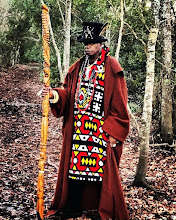| | In Nigeria an elderly man pauses near a laterite stone outside of the main entrance of an Ijesha family compound and pours libation as he prays for the continued protection and well being of the occupants. On a Caribbean island as ceremonial drums provide sacred rhythms in the background, the guest of honor steps forward through the crowd draped in red cloth while holding a crook staff and stops periodically to speak in parables to island residents that have come seeking guidance. Upon entering a Lucumi olorisha home in a Midwestern urban area, a Candomble priestess kneels before a shrine, claps her hands three times as she sings Oriki (sacred praise names) to the Yoruba deity of chance. All are paying homage to �s�, one of the most powerful deities in the orisa pantheon. In the Yoruba pantheon, Elegba is a deity, the divine messenger of Olodumare. Elegba is a guardian, protector and communicator. Through divination, he guides the fate of man. In West Africa and all through the Diaspora he is revered. The Fon call him Legba. He is called �s� (eshu), �legba and �legbara among the Yoruba. In Brazil for the practitioners of Candomble, he is Exu. The Lucumi of the New World know him as Eshu Eleggua. These references are sacred praise names or "oriki" for Eshu-Elegbara. Oriki is used to describe the attributes or to recount the adjectives that describe an orisha. When we examine the name Elegbara, we find it is comprised of two words. The word "ele" means messenger. "Agbara" means power or authority. Accordingly this oriki defines the deity Eshu role as messenger and holder of Olodumare's �s� (power and authority). Symbols such as an Eshu figure holding a calabash, personify this attribute. Omo orisha throughout the Diaspora recognize Eshu Elegbara as a deity that holds the power to make things happen* - good or bad. For this reason he is propitiated to assure that all communication or action will not encounter negative influence or obstruction. As trickster, Eshu is associated with disorder and destiny in the Yoruba pantheon. As "orisa orita" or "esu orita", orisha of the crossroad or the corners, Elegba represents the transitional or center point of the crossroad where one must make a decision. In this position, Elegba represents all the bewilderment and confusion one faces when attempting to make the proper choice. Once the choice is made, he is involved in the consequences and through his own devices guides us towards and along our proper path. His ambivalence to orisa and man makes Elegba a complex, neutral force. For those who live in accordance to social and religious law, he is a great benefactor and guardian. Those who choose to live contrary" will meet him on their path as the "law enforcer" or "divine policeman". The personified characteristics of Elegba are contradictive. For example, he is a loyal friend and very generous. He is the dispenser of punishment and shows loyalty to no one, man or orisa. Practitioners are quick to say "Elegba will lift you up very high with his hands and in the next instance open his hands so that you fall". These contradictive aspects Elegba represent the belief that Olodumare (a descriptive name for God) is all-powerful and not bound by any rules. All that is good and bad lies within Olodumare's power (�s�). Esu Elegbara as the holder of Olodumare's �s� (the power to make things happen) dispenses it in accordance to the Olodumare's will. |


No comments:
Post a Comment